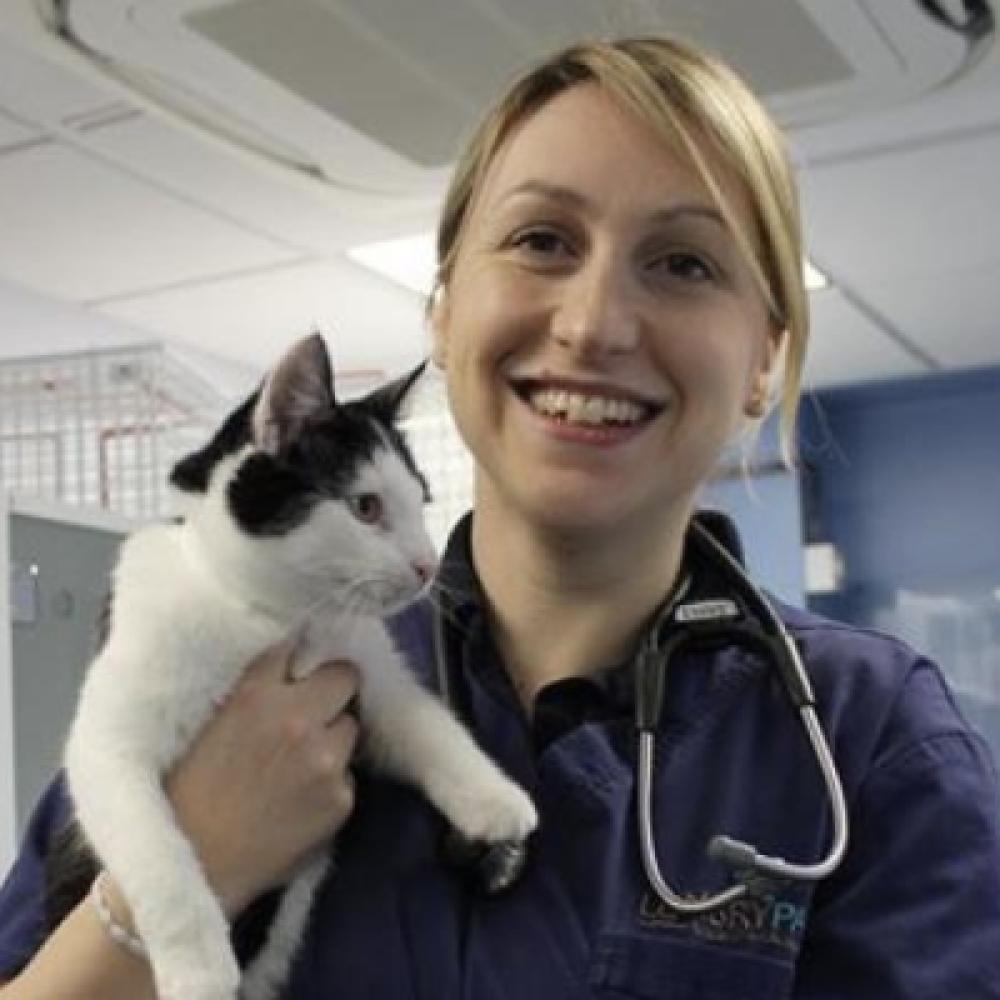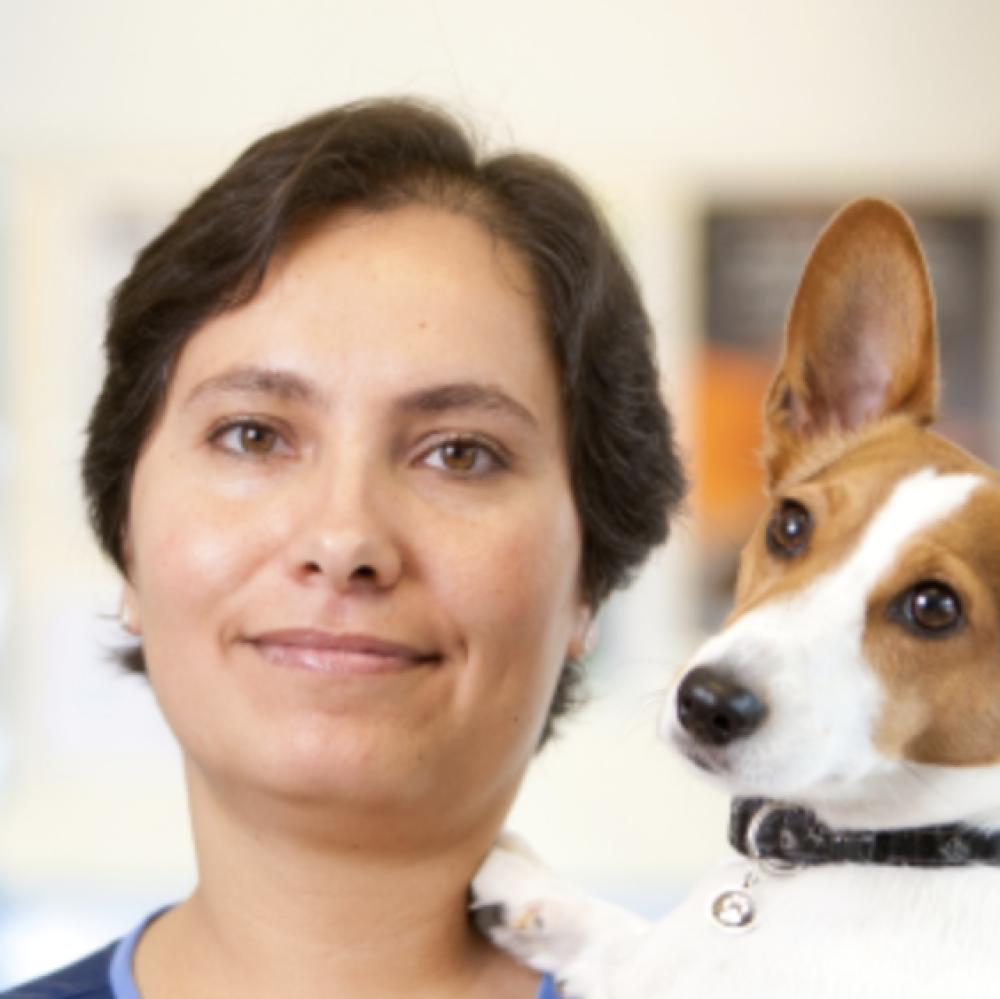£1000 off from 28th November until 3rd December with discount code BF-VET-25
Learn at your own pace, wherever you are, with our Feline Practice Online Learning Programme
Our Feline Practice Postgraduate Certificate CPD programme has been crafted to elevate your expertise in feline care, all while fitting seamlessly into your professional life. Each module offers invaluable insights and practical tips from our expert tutors, enhancing your clinical approach to feline medicine. With diverse modules delivered through a world-leading interactive platform, you'll gain new knowledge and skills while engaging with an online community that shares your passion for advancing feline care in practice.
Hear what our delegates have to say
Don’t just take our word for it - our delegate feedback speaks for itself.
Key features of this programme
16 varied modules
Covering key feline subjects delivered over 24 months
Support and guidance from a Module Tutor who is recognised in their subject field
The specialist in the subject area will provide online support during each module and will be available to answer all your questions
Multiple learning processes
Presentations, written notes, interactive quizzes and exercises which test your knowledge as you work
Discussion forum
A discussion forum for conversation, debate and sharing cases with your peers and Module Tutors
Course Director
Samantha Taylor BVetMed (Hons) CertSAM DipECVIM-CA MRCVS, oversees the programme ensuring the latest Feline content
Four sessions per month
Each module consists of four sessions spread over one month. Sessions comprise separate lessons and case-based studies to work through at your own pace
100% online
Giving you access 24/7 wherever you are
Regular assessments
Pre-module and post-module assessments encourage you to reflect on your learning and evaluate your progress
Dedicated Programme Tutor
A dedicated Programme Tutor who will support you every step of the way
Interactive and engaging modules
Which allow you to absorb the learning materials in an online environment
16 varied modules
Covering key feline subjects delivered over 24 months
Support and guidance from a Module Tutor who is recognised in their subject field
The specialist in the subject area will provide online support during each module and will be available to answer all your questions
Multiple learning processes
Presentations, written notes, interactive quizzes and exercises which test your knowledge as you work
Discussion forum
A discussion forum for conversation, debate and sharing cases with your peers and Module Tutors
Course Director
Samantha Taylor BVetMed (Hons) CertSAM DipECVIM-CA MRCVS, oversees the programme ensuring the latest Feline content
Four sessions per month
Each module consists of four sessions spread over one month. Sessions comprise separate lessons and case-based studies to work through at your own pace
100% online
Giving you access 24/7 wherever you are
Regular assessments
Pre-module and post-module assessments encourage you to reflect on your learning and evaluate your progress
Dedicated Programme Tutor
A dedicated Programme Tutor who will support you every step of the way
Interactive and engaging modules
Which allow you to absorb the learning materials in an online environment
Programme details
Module Summary
01 - Feline Musculoskeletal Disease
Key learning objectives:
- Perform an orthopaedic examination and be familiar with the presentation of osteoarthritis in the cat
- Understand the value of radiography, synoviocentesis, muscle and nerve biopsies
- Apply first aid techniques to fracture patients
- Explain the principles of orthopaedic surgery and the approach to the repair of common fractures
02 - Feline Behaviour
Key learning objectives:
- Consolidate your understanding of normal cat behaviour
- Understand the clinical causes of feline behavioural problems
- Formulate an approach to common problems such as inappropriate toiletting, spraying, aggression and compulsive disorders
- Review and apply strategies for improving core territory security
03 - Feline Ophthalmology
Key learning objectives:
- Understand the normal feline eye and use readily available diagnostic equipment and disposables in feline ophthalmic cases
- Perform common surgical procedures pertinent to feline ophthalmology
- Approach the medical management of ophthalmic patients
- Know when to refer a patient
04 - Feline Anaesthesia and Surgical Principles
Key learning objectives:
- Apply knowledge gained to surgical asepsis and theatre protocol
- Rationally utilise antibiotics in surgical patients
- Be familiar with suture materials and patterns, surgical instruments and tissue handling
- Plan surgery, apply haemostatic techniques and manage crises
- Approach the management and reconstruction of wounds
Online Anaesthesia component:
- Describe a range of parenteral and inhalational anaesthetic regimes
- Understand the pharmacokinetics of different anaesthetics and monitoring techniques available
05 - Feline Dermatology
Key learning objectives:
- Formulate a differential diagnosis, investigation plan (including laboratory investigations) for common dermatological presentations including alopecia, pruritus, infectious and auto-immune conditions, allergic skin disease and neoplasia
- Have knowledge of treatment strategies for common dermatological presentations including alopecia, pruritus, infectious and auto-immune conditions, allergic skin disease and neoplasia
- Be aware of and be able to recognise dermatological manifestations of systemic disease
06 - Feline Oncology
Key learning objectives:
- Understand the clinical relevance of tumour biology and be able to discuss the most common neoplasms of the major organ systems
07 - Feline Clinical Pathology and Laboratory Diagnosis
Key learning objectives:
- Develop a thorough knowledge of sampling techniques, the limitations of technology and equipment and the factors that can generate artefacts or abnormalities
- Interpret results and propose further investigations
- Understand the methodology involved in the generation of haematology, biochemistry and cytology profiles
- Have an awareness of the various diagnostic tests for endocrine and infectious diseases ( viral, parasitic- including heartworm- and bacterial) the techniques used and their interpretation
- Recall the cytology of haemic and non-haemic cell populations, both reactive and neoplastic, and have the ability to trace or plot maturation and degeneration pathways in blood, fluid and tissue smears
08 - Feline Critical Care and Emergency Case Management
Key learning objectives:
- Perform triage, assess patients and prioritise cases
- Undertake emergency monitoring and stabilisation
- Understand the effects, clinical signs and treatment for common toxicities including insecticides, molluscicides, rodenticides, herbicides, household preparations and plants
- Be familiar with critical therapeutics including fluid and electrolyte therapy, transfusion medicine cardiovascular and respiratory support, analgesia and CPR
09 - Feline Urinary Tract
Key learning objectives:
- Understand the causes of renal dysfunction, the presentation and diagnostic tests utilised in cats with clinical signs of renal disease (including acute/ chronic renal insufficiency, glomerular disease, neoplasia and inherited diseases)
- Describe the causes and emergency treatment of acute renal failure
- Explain the pathophysiology of renal dysfunction and the importance/ significance of hyperphosphataemia, anaemia, proteinuria and hypertension
- Apply knowledge of the International Renal Interest Society staging scheme for chronic renal disease to patient prognosis
- Discuss the advantages and disadvantages of the available treatments for CRI including phosphate binders, ACE inhibitors and dietary modification
- Recall the neuroanatomy of the lower urinary tract and the differentiation of upper motor neuron/ lower motor neuron defects
- Approach diseases of the lower urinary tract including FLUTD, urolithiasis, urinary tract infections and neoplasia and understand their differentiation, risk factors, treatment and dietary management
10 - Feline Neurology
Key learning objectives:
- Be able to recognise the clinical signs associated with neurological disease
- Perform a neurological assessment using appropriate tests and intepret the results
- Describe how to localise lesions and the value this provides to the clinician
- Plan a neurological investigation and list the major feline neurological diseases on the basis of localisation
- Define a diagnostic approach for abnormalities including seizures, spinal cord and cranial nerve abnormalities and peripheral neurological diseases
- List the common feline neurological diseases including their presentation, diagnosis and treatment
11 - Feline Liver, Pancreas and Gastrointestinal Tract
Key learning objectives:
- Know how to investigate and manage common medical conditions affecting the feline oesophagus, stomach, small and large intestine, liver and pancreas
- Describe the various tests used in the diagnosis of liver and pancreatic disease and the management options for the common hepatic medical disorders
- Approach the nutritional management of disorders of the liver, pancreas and gastrointestinal tract
12 - Feline Respiratory Medicine
Key learning objectives:
- Approach the common presentations of respiratory disease including nasal discharge, epistaxis, coughing, stertor, stridor, sneezing and reverse sneezing
- Diagnose and treat upper respiratory tract diseases, both acute (infectious) and chronic (inflammatory or infectious or neoplastic in origin)
- Formulate an approach to allergic lower respiratory tract disease including differential diagnoses, investigation and treatment of allergic airway disease, parasitic disease and pulmonary fibrosis
- Understand pleural space disease including differential diagnoses, investigation and therapeutics
13 - Feline Cardiology
Key learning objectives:
- Recognise the importance of a detailed history and clinical examination of the cardiovascular and respiratory systems in the diagnosis of cardiopulmonary diseases
- Review and understand the common causes of heart disease in cats
- Consolidate your understanding of the central importance of blood pressure in the pathophysiology of cardiac disease in cats and know how to discriminate the causes of hypertension in this species
- Define the crucial role of high quality imaging modalities (especially ultrasonography and radiology) in the differential diagnosis of feline cardiopulmonary diseases
14 - Feline Endocrinology
Key learning objectives:
- Define the clinical signs of feline endocrine diseases and understand their pathogenesis – including hyperthyroidism, diabetes mellitus, acromegaly, hyperaldosteronism, hyperadrenocorticism and parathyroid disorders.
- Describe the principles of key diagnostic tests and their application for the above feline endocrine diseases
- Understand the management of common feline endocrine diseases and know how to approach complications such as diabetic ketoacidosis and unstable diabetes
15 - Feline Infectious Diseases I
Key learning objectives:
- Describe health and safety concerns and precautions relating to zoonoses
- Understand the legislation and regulations relating to infectious diseases
- Design and implement vaccination and preventative parasitic programmes
- Approach the pathophysiology, diagnosis and, where appropriate, treatment of common viral diseases including FeLV, FIV and FIP
- Diagnose and treat Haemoplasma infections
16 - Feline Infectious Diseases II
Key learning objectives:
- Explain the diseases of hunting cats including Toxoplasmosis, Pox virus, Mycobacterial disease and Salmonellosis
- Approach enteric infections of the cat including protozoal disease (Trichomonas foetus, Cryptosporidium, Giardia and Isospora) and bacterial/ viral disease
- Understand fungal mycoses
- Control infectious and zoonotic disease in the home, clinic, shelters and cattery situations
Qualifications
The Feline Practice Online Learning Programme offers you a comprehensive range of structured learning with the ultimate flexibility to access the training that you want whilst working around your busy practice life.
You can choose to let the Programme give you new knowledge and skills to take back to practice or you can work towards a recognised qualification.
General Practitioner Certificate (GPCert)
By attending the full online structured programme and following successful assessment including an exam you can gain the GPCert awarded by the International School of Veterinary Postgraduate Studies (ISVPS).
Only registered veterinary surgeons who have been qualified for a minimum of one year can apply to undertake a General Practitioner Certificate.
Postgraduate Certificate (PgC)
A route to a PgC in Feline Practice is available through our partnership with Harper Adams University (HAU).
The PgC is a recognised higher education qualification demonstrating that you have achieved the required standard within a designated subject. The qualification represents Masters Level 7 within the Quality Assurance Agency’s framework for higher and further education. In order to apply for this route, additional assessments will be necessary, please contact us for further information.
For GPCert and PgC fees please see our pricing table in the ‘Pricing’ tab above.
RCVS Advanced Practitioner Status
On September 2025, the Royal College of Veterinary Surgeons (RCVS) announced an updated process for reviewing and accrediting postgraduate certificates that lead to eligibility for Advanced Practitioner (AP) Status.
This is an important development for the profession, ensuring that the AP designation remains a robust and meaningful recognition of advanced veterinary knowledge and skills providing greater confidence for veterinary professionals, clients, and the wider public.
Improve Veterinary Education and ISVPS fully support this enhanced level of scrutiny and has updated its GP Certificate (GPCert) programmes and assessments to meet the new RCVS criteria. These programmes have been submitted for review, and accreditation is currently pending as the RCVS AP Subcommittee works through applications.
Speakers
Pricing
£7,500.00
£8,099.00£2,499.00
Payment & VAT Information
1. Many of our courses come with deferred payment and instalment options. Click “Book Now” to see what’s available for this course.
2. All prices will be displayed exclusive of local sales tax.
Payment Terms & Conditions
Registration Information
100% Satisfaction
We're completely confident in the quality of our training and CPD. So much so that if you're not 100% satisfied with your certificate course, we'll give you a 100% refund. Just get in touch with us within 30 days of your start date and we'll sort the rest. T's and C's apply.
Find out moreFAQs
Practical Sessions
Where are practical CPD courses or face-to-face modules held?
What will the timings be for face-to-face certificate modules and practical CPD sessions? How will my day be structured?
Where do the cadavers come from for the practical CPD and surgical modules/courses?
What should I wear to a practical CPD course/module?
I will be travelling from overseas, do I need a Visa?
Will the dogs used for practical CPD courses be sedated?
Will the dogs used for scanning have any abnormalities?
Are the dogs used for ultrasound CPD clipped?
Are cats used for any of the ultrasound courses?
Postgraduate Certificates (PgCs)
Royal College of Veterinary Surgeons (RCVS) Advanced Practitioner (AP) Status – what has the RCVS announced?
What is a Postgraduate Certificate (PgC)?
Am I eligible for the PgC programme?
How do I enrol on the PgC programme?
I have previously achieved a GPCert. Can I still upgrade to a PgC?
Is the PgC equivalent to the RCVS CertAVP, BSAVA PGCert, and other university-awarded veterinary postgraduate certificates?
How are Improve’s PgCs different from other providers?
Will a PgC enable me to apply for the RCVS Advanced Practitioner Status?
How will I be assessed for the PgC?
What does the PgC fee include?
What’s not included in the PgC fee? Do I need to budget for further costs?
Payments & Finance
What payment methods do you accept?
Do you offer any flexible payment plans?
What payment methods can I use for setting up a direct debit?
Do you issue separate invoices for each instalment?
Why was my Direct Debit payment not charged on the day that is established in my payment plan?
Why couldn’t I make payment during check-out?
Where can I find the bank details for the bank/wire transfer?
What happens if my circumstances change and I need to cancel my order?
When is payment for my veterinary CPD course due?
How much do the veterinary CPD courses and certificate programmes cost?
My course includes assessments with HAU, how do I make payment for these?
My CPD course includes assessments with ISVPS, how do I make payment for these?
Can I pay by Direct Debit?
Online Learning & Platform
Is there a discussion forum or way to interact with other delegates?
What happens if I lose internet connection or need to pause my session?
How do I track my progress in each online module?
Can I access course materials on mobile devices or offline?
What are the technical requirements to access online courses?
If coming from a non-European country – how would face-to-face module attendance work for the PgC?
How do I register for the GPCert and/or the PgC?
Is the PgC programme recognised by other countries?
General Practitioner Certificates (GPCerts)
What is the criteria for enrolling in a General Practitioner Certificate programme?
What is the difference between a GPCert and a PgC?
Can I use this veterinary certificate programme towards my veterinary CPD hours?
How long does a General Practitioner Certificate (GPCert) take to achieve?
I want to register for a veterinary certificate course but I may be away for some of the modules. Does this mean I will miss out?
How long do I have to finish the modules for my GPCert?
What resources will be available to support me through the certificate programme?
How long do I have access to the course material for?
How will I be assessed for the GPCert?
What happens if I am not eligible to sit the assessments and/or exam with my cohort?
What does the General Practitioner Certificate programme fee include?
What’s not included in the certificate programme fee? Do I need to budget for further costs?
Will my veterinary postgraduate qualification be recognised in other countries?
Can I take a postgraduate certificate if coming from a non-European country? How do face-to-face modules work?
How are Improve’s PgC programmes different to other providers?
Where are the taught programmes held?
Are Improve’s Postgraduate Certificates academically equivalent to the RCVS CertAVP and other postgraduate certificates?
Over what time period can I take the taught modules?
I want to register on a modular course but I may be away for some of the modules. Does this mean I will miss out?
What resources will be available to support me through the PgC?
No ordinary online learning experience
Learn with the leading global provider of online veterinary CPD!
Find out more



















